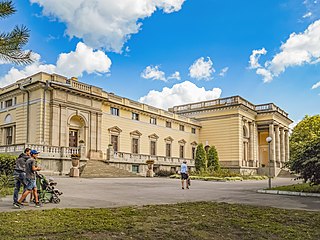See also
Surname list
This page lists people with the surname Lipmann. If an internal link intending to refer to a specific person led you to this page, you may wish to change that link by adding the person's given name(s) to the link.
Lipmann is a surname. Notable people with the surname include:
Yom Tov or Yom-Tov may refer to:
Zunz is a Yiddish surname:
Lippman is a surname. Notable people with the surname include:

Rabbi Gershon Shaul Yom-Tov Lipmann ben Nathan ha-Levi Heller, was a Bohemian rabbi and Talmudist, best known for writing a commentary on the Mishnah called the Tosefet Yom-Tov (1614–1617). Heller was one of the major Talmudic scholars in Prague and in Poland during the "Golden Age" before 1648.

Nemyriv is a historic town in Vinnytsia Oblast (province) in Ukraine, located in the historical region of Podolia. It was the administrative center of former Nemyriv Raion (district). Population: 11,421
Zeitlin is a matronymic Jewish surname. It is derived from the female name Zeitl according to the rules of Slavic languages, with the possessive suffix '-in' and literally means "Zeitl's".
Teitelbaum is a Jewish surname. Variants include Tetelbaum, Teitelboim
Lippmann is a German surname. Notable people with the surname include:
Halevi may refer to:
Lipkin is a surname. Notable people with the surname include:
Yom-Tov Lipmann ben Solomon Muhlhausen was a controversial Talmudist, kabalist and philosopher of the 14th and 15th centuries. His religious and scholarly career and influence spanned the Jewish communities of Bohemia, Poland, Austria and various parts of Germany, and his dispute with the principles of Christianity left a lasting imprint on the relations between Christianity and Judaism.
Benzion Rakow (1925–1985) was a British communal rabbi and rosh yeshiva of Chayei Olam Yeshiva in Golders Green, London. He was also active in Agudas Yisroel of Great Britain.
Heller is a surname. Notable people with the surname include:
Pesukei dezimra, or zemirot as they are called in the Spanish and Portuguese tradition, are a group of prayers that may be recited during Shacharit. They consist of various blessings, psalms, and sequences of other Biblical verses. Historically, reciting pesukei dezimra in morning prayer was a practice of only the especially pious. Over the course of Jewish history, their recitation has become widespread custom among all of the various rites of Jewish prayer.

The Old Jewish Cemetery of Kraków, more commonly known as the Remah Cemetery, is a historic necropolis established in the years 1535–1551, and one of the oldest existing Jewish cemeteries in Poland. It is situated at 40 Szeroka Street in the Kazimierz district of Kraków, beside the 16th-century Remah Synagogue. The cemetery bears the name of Rabbi Moses Isserles, whose name is abbreviated as Remah.

Yehuda Heller-Kahane was a Rabbi, Talmudist, and Halachist in Galicia. He was known as "the Kuntras HaSfeikos" based on his work, Kuntras HaSfeikos.

Yossele the Holy Miser was a Jew who lived in medieval Poland in the Kazimierz Jewish quarter of Kraków in the 17th century. His apparent stinginess but hidden generosity is at the center of a well-known tale of Jewish folklore that speaks to one of the highest levels of tzedakah (charity) in the Jewish tradition: giving anonymously. The Holy Miser's tombstone can be found in the Remah Cemetery of Kraków next to the grave of the renowned Rabbi Yom-Tov Lipmann Heller.
Book of Victory may refer to:
Kessel is a metonymic occupational name for a maker of copper cooking vessels. Notable people with the surname include:
Yom rendered as day in English translations from the Hebrew (יום) and Arabic (يوم)